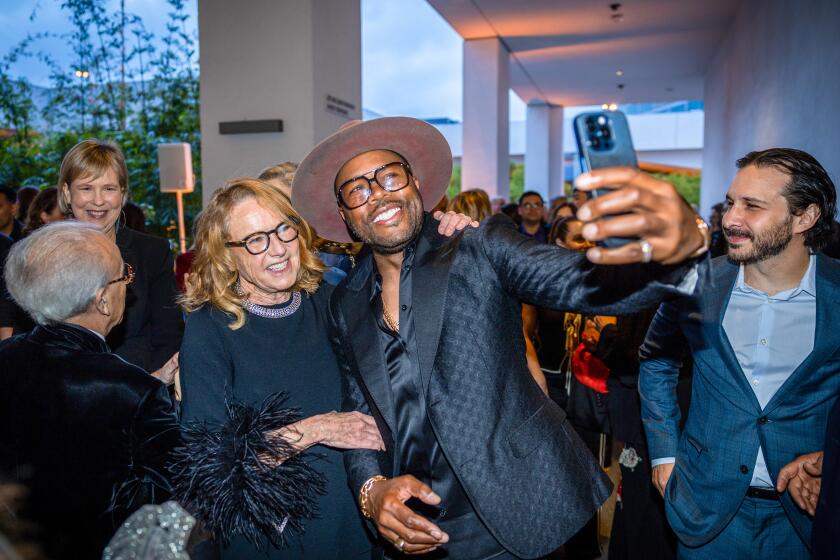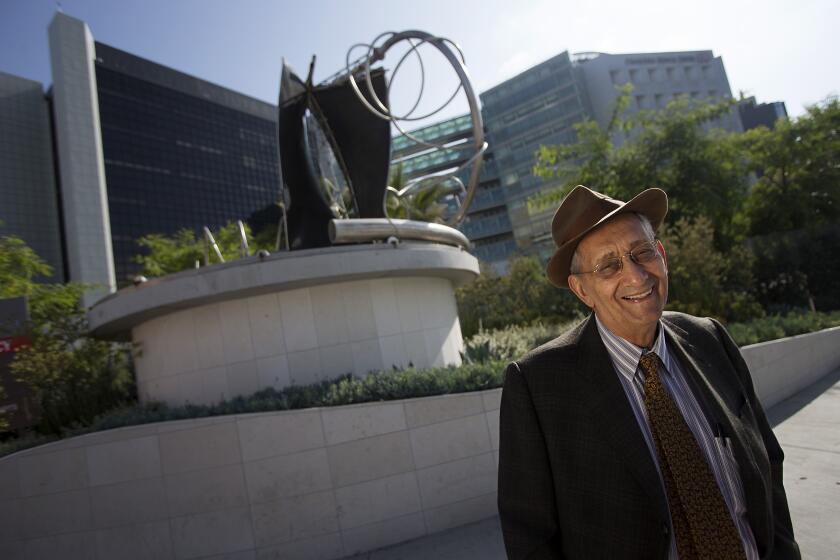The New Guard : Reformed D’Oyly Carte Aims To Do Right by Gilbert and Sullivan
In 1875, British theater impresario Richard D’Oyly Carte had dreams of establishing a school of English comic opera and so brought together the contentious librettist W. S. Gilbert and the queen’s favorite composer, Arthur Sullivan.
They were asked to create a companion piece for Offenbach’s “La Perichole,” then playing at a theater D’Oyly Carte was managing, and their new one-act opera--”Trial by Jury”--proved a triumph. D’Oyly Carte had found his ideal team and worked hard over the next 20 years to keep the partnership together. By 1881, on the profits of the operas, Carte was able to build the Savoy Theatre to permanently house the company. (With profits still rising, he built the Savoy Hotel eight years later.)
The duo’s efforts came to epitomize comic opera, but when the copyright on the Gilbert and Sullivan works ran out in the 1960s, newfangled directors declared open season on the famous team.
They created new productions--some with jazzed-up scores and hyped-up jokes, and some even laden with the best of intentions. Suddenly, the tried and true productions of the D’Oyly Carte Opera Company seemed tired and trite.
Alas, after 107 years, the company devoted to G&S; shut its doors in 1982, victim of the new era. But after death came the resurrection.
The new D’Oyly Carte, reconstituted in 1988, is marking its first engagement in the United States with productions of “The Mikado” today, , and “The Pirates of Penzance,” Friday through Sunday, at the Orange County Performing Arts Center in Costa Mesa. The run is part of the Festival of Britain, an arts festival and retail promotion.
Officials of the new company are understandably nervous.
“This is probably the most important single engagement the company’s had since it was re-formed,” Michael Bishop, chairman of the new company, said while inspecting the center in August. Bishop is chairman of British Midland Airlines, which provided half the capital to re-establish the company. The artistic director of the company is Bramwell Tovey, previously with the Sadler’s Wells Ballet (who did not accompany Bishop to Costa Mesa).
“It’s quite a challenge to come back to America. . . . I would say we were chased away last time. And there are good reasons why we shouldn’t come back too soon. “
Indeed, Times Music Critic Martin Bernheimer--writing of the company’s demise in 1982--recalled its previous local tour:
“In the summer of ‘76, the company already had fallen on hard times. It was, in fact, a thing of shreds and patches. A small, brave band of singers, generally more dedicated than talented, lumbered through ritualistic paces in the hostile confines of the Greek Theatre. The productions looked old and cheap and worn. Everyone--well, almost everyone--seemed tired. Inspiration was conspicuously absent.”
Bernheimer did allow, however, that “as always, there were flashes of excellence, even amid the artistic doldrums.”
What also tipped the scales against the old company was the refusal of the Arts Council of Great Britain to give it a grant, complaining that the productions were “tired and wooden.”
“The (old) company really got to the stage where it couldn’t carry on because it got too mechanical,” Bishop said. “Yes, it was a faithful interpreter of the words and the music, but the company would deliver it in a way which had become repetitive. It became obviously unsuitable to the pressures that had been building up by people who were bringing in new versions.”
He added that “superfluous gags, staging and jokes crept in over the years.”
“They had become very popular and, in fact, almost had become expectations. People had begun to imagine that they had been originally intended. And that’s not the case.”
The new company, however, has trimmed those sails, cut what Bishop called “the institutionalized encores” and has acquired a leaner and younger look.
“The approach of the company is a youthful approach,” he said. “The average age of the company is now under 30. Some of the principals, of course, are older. But it doesn’t betray any immaturity when you see the production in terms of the age of the people represented on stage. The actual balance is absolutely right.
“The old company were permanent. They would have sung with them forever, for two or for 25 years. We are now a company that is re-formed every season. We’ve had people with us now for three seasons. But nonetheless they had stood down (re-auditioned) at the start of each season, and new people come into the company every year.”
The new company does not necessarily regard itself as the guardian of the authentic G&S; tradition.
“It sounds very pompous to say that we are the ‘guardians of tradition,’ ” Bishop said. “I don’t really see ourselves in that way. I think you have to earn this accolade rather than say that this is what we are.
“But we do hope that we will be that over a period of time. The public and the critics will judge whether we achieve what we set out to do.”
In fact, Bishop appears to stress only half of the famous partnership.
“What we set out to do is to be the definitive performers of the music, but not necessarily the drama,” he said. “I don’t think we are trying to throw any of Gilbert’s intentions overboard. But we have felt . . . that we’ve actually been able to bring a considerable breath of fresh air to the way in which the productions have been staged.
“But in no sense are we turning these productions into musicals,” he cautioned. “We are only recruiting from people who have had a long term career in opera.”
Bishop describes the two productions to be seen in Costa Mesa as “strongly contrasting ones. They were both created in 1989.”
“The production of ‘The Mikado’ scenically is a very traditional production,” he said. “Both set designer Eileen Diss and costume designer Jessica Gwynne decided to use a very limited palette of colors of dyes that were available from natural sources to the Japanese at around the time that it’s fictionally set. And so that’s a very traditional approach to ‘The Mikado.’
“The ‘Pirates of Penzance’ is somewhat more modern in its approach and utilizes some more modern production techniques, which I don’t want to spoil for the audience. The set is not naturalistic. It’s not set on a rocky promenade. It’s a unit set that serves many purposes and is quite ingenious in its application. It’s a set which becomes increasingly more interesting as the performance goes on.”
The company commissioned Keith Warner, a staff producer with the English National Opera, to direct “Pirates.”
Says Bishop: “I think he succeeded in getting the right blend of not moving away from the definitive interpretation of the score but nevertheless injecting into it, not quite as robust as say, Joe Papp’s ‘Pirates’--that was a swashbuckling musical--but he’s gone a long way to actually livening up the musical interpretations of the words. I hope it’s the right blend.”
The true Savoyard may be puzzled why the new company is bringing two very well-known works, as opposed to their new productions of “Iolanthe” or “The Yeomen of the Guard” (both date from 1988).
“I think the repertoire is perhaps better known on the East Coast than on the West Coast,” said Bishop, “and I think that we’re coming to a new area, which perhaps has probably not got the same basic, intrinsic audience for the works.
“Maybe if we’d gone to New York or the East Coast, I think probably we could be more adventurous. But I think of coming here, that this is a building block for the future.”
Although the original company shut down in 1982, the D’Oyly Carte Opera Trust continued, according to Bishop. Further, before her death in 1985, Dame Bridget D’Oyly Carte, granddaughter of founder Richard D’Oyly Carte, left a bequest of about $2 million “specifically to restart the company,” Bishop said.
“To that, which we got the interest from, my company, British Midland Airways, matched the income bequest. Together, between the two, we were able to get the capital to restart the company.”
The new D’Oyly Carte mounts two new productions a year and operates on an annual budget of $2 million. This year, the company created a new “H.M.S. Pinafore” and “Trial by Jury,” bringing the total restagings now to six, almost midway through the canon.
But if this is the beginning of one era, it’s also the end of another, according to Bishop.
“When we get back to England, we’ll be getting ready to produce operas other than Gilbert and Sullivan,” Bishop said. “The D’Oyly Carte is actually going to diversify. . . . I think there is a place in Britain for us to become the national light opera company.”
Further, the company will be leaving London and moving to a new home and permanent base in Birmingham beginning in January.
“We’re going to have much more resources because they are giving us accommodations for a front office and giving us a theater, which they’re refurbishing for us, and in which we’ll be playing in twice a year,” Bishop said.
“From the company point of view, we will have a lot more support behind us in the future than we’ve had in the past. It’s been quite a difficult thing to run a company of this size without government aid or any other kind of aid.
“I think we’ve got very firm ground to build on for the future. But one of the most important things is to bring younger people back in to see the shows, because one of things that was happening was that the audience was getting ancient along with the productions.
“We’ve got to bring younger people back in. But we think we’re doing all right.”
What: The D’Oyly Carte Opera Company of Great Britain.
When: “The Mikado” Thursday, Oct. 18, at 8 p.m.; “The Pirates of Penzance” Friday, Oct. 19, and Saturday, Oct. 20, at 8 p.m., and at 2 p.m. Saturday and Sunday, Oct. 21.
Where: The Orange County Performing Arts Center, 600 Town Center Drive, Costa Mesa.
Whereabouts: One block east of the South Coast Plaza shopping center.
Wherewithal: $12 to $38.
Where to call: (714) 556-2787.
More to Read
The biggest entertainment stories
Get our big stories about Hollywood, film, television, music, arts, culture and more right in your inbox as soon as they publish.
You may occasionally receive promotional content from the Los Angeles Times.






